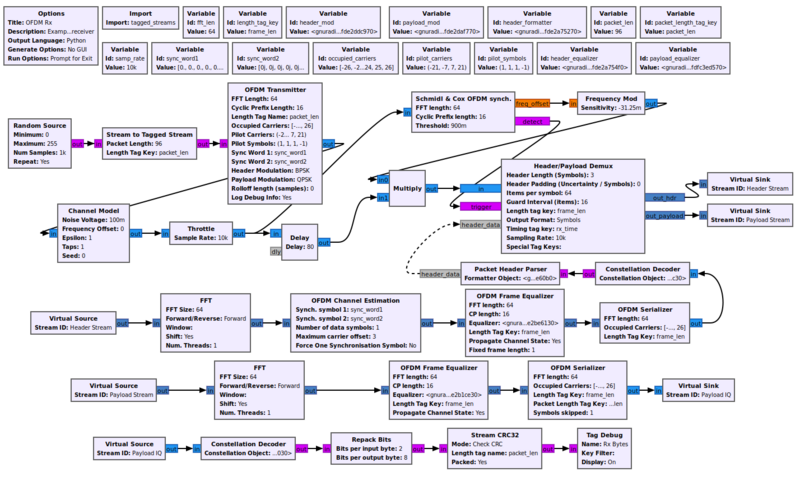OFDM Frame Equalizer: Difference between revisions
Jump to navigation
Jump to search
No edit summary |
|||
| Line 35: | Line 35: | ||
== Example Flowgraph == | == Example Flowgraph == | ||
This flowgraph can be found at [https://github.com/gnuradio/gnuradio/blob/master/gr-digital/examples/ofdm/rx_ofdm.grc]. | |||
[[File:Rx_ofdm_fg.png|800px]] | |||
== Source Files == | == Source Files == | ||
Latest revision as of 02:45, 30 November 2020
Performs equalization in one or two dimensions on a tagged OFDM frame.
This does two things:
First, it removes the coarse carrier offset. If a tag is found on the first item with the key 'ofdm_sync_carr_offset', this is interpreted as the coarse frequency offset in number of carriers.
Next, it performs equalization in one or two dimensions on a tagged OFDM frame. The actual equalization is done by a ofdm_frame_equalizer object, outside of the block.
Note that the tag with the coarse carrier offset is not removed. Blocks downstream from this block must not attempt to also correct this offset.
- Input
- a tagged series of OFDM symbols.
- Output
- The same as the input, but equalized and frequency-corrected.
Parameters
- FFT length
- Used to set the input and output vector sizes
- CP length
- Length of the cyclic prefix in samples (required to correct the frequency offset)
- Equalizer
- The equalizer object that will do the actual work
- Length Tag Key
- TSB key
- Propagate Channel State
- If true, the channel state after the last symbol will be added to the first symbol as a tag
- Fixed frame length
- Set if the frame length is fixed. When this value is given, the Length tag key can be left empty, but it is useful even when using tagged streams at the input.
Example Flowgraph
This flowgraph can be found at [1].
Source Files
- C++ files
- [2]
- Header files
- [3]
- Public header files
- [4]
- Block definition
- [5]
